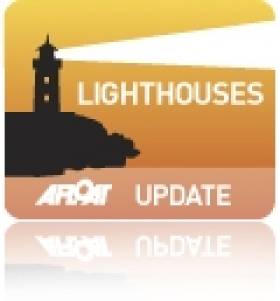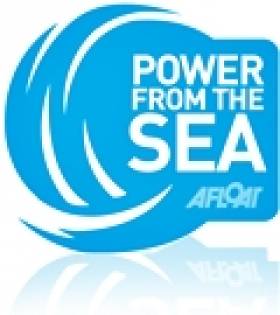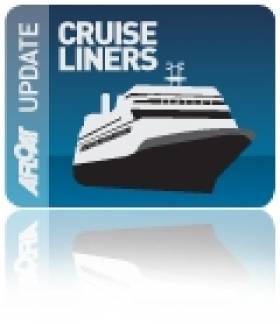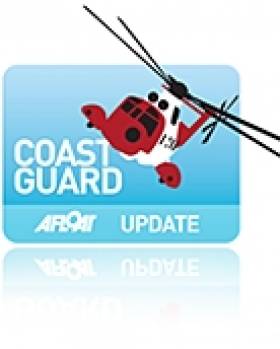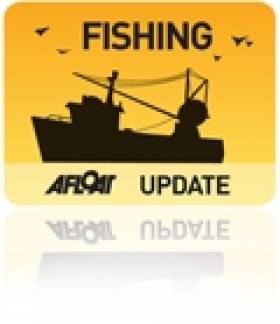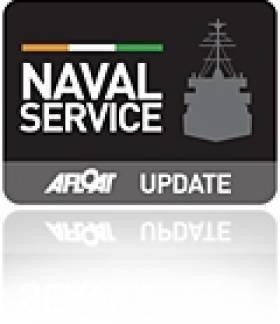Displaying items by tag: EU
#lighthouses – A "brand new experience to take your breath away", that's the promise from Great Lighthouses of Ireland, a new EU INTERREG IVA funded tourism initiative being launched by the Commissioners of Irish Lights.
Featuring twelve lighthouses in stunning coastal locations, Great Lighthouses of Ireland will offer memorable, enriching experiences that inspire the senses, refresh the spirit and fire curiosity, creating a deep appreciation of the role of the sea, lighthouses, past and present, and the maritime and seafaring story of the island of Ireland.
With a range of services from accommodation to visitor centres and guided tours, visitors from home and abroad will have the chance to explore the distinct experiences offered by the lighthouses, each reflecting its own history and heritage, nature and environment, people and place, with aspects to appeal to people of all ages and interests.
The Great Lighthouses of Ireland project is supported by the European Union's INTERREG IVA cross-border Programme, managed by the Special EU Programmes Body. The ambitious and imaginative cross-border project will include the preservation and conservation of the island of Ireland's important maritime and lighthouse heritage. Great Lighthouses is built on a sustainable economic model and the re-invention of individual lighthouses as visitor attractions and specialist self-catering accommodation that can contribute to local communities in terms of jobs and specialist tourism.
Irish Lights operate over seventy lighthouses around the coast of Ireland. These lighthouses, including the Great Lighthouses of Ireland, still play a vital role in maritime safety.
Great Lighthouses of Ireland partners include the Irish Landmark Trust, the Royal Society for Protection of Birds, Forbairt Fhanada Teoranta (Fanad Community Group), Clare County Council, Ballycotton Lighthouse Tours, Mid & East Antrim Borough Council, Hook Heritage limited, Valentia Island Development Company, Kerry County Council and Clare Island Lighthouse. Great Lighthouses of Ireland is also supported by Tourism Ireland, Fáilte Ireland and Tourism Northern Ireland.
Great Lighthouses of Ireland
St John's Point, Co Donegal
Fanad Head, Co Donegal
Rathlin West Light, Co Antrim
Blackhead, Co Antrim
St John's Point, Co Down
Wicklow Head, Co Wicklow
Hook, Co Wexford
Ballycotton, Co Cork
Galley Head, Co Cork
Valentia Island, Co Kerry
Loop Head, Co Clare
Clare Island, Co Mayo
Marine Energy Activities Boosted With Extra €4.2m in EU Funding
#powerfromthesea – Minister for Communications, Energy & Natural Resources Alex White T.D. welcomed the announcement that the SFI Centre for Marine Renewable Energy Ireland (MaREI) had successfully raised an additional €4.2 million in funding from EU research funds for marine energy activities.
The announcement of the substantial EU funding was made to an audience of more than 130 industry and university representatives involved in a variety of marine energy research projects, attending the MaREI Industry Open Day at the National Maritime College of Ireland in Cork.
"I want to commend MaREI on their success in securing substantial EU support to fund their very important research and development work. It is truly laying the foundations for both the energy system and economic opportunity of the future."
Speaking at the MaREI Industry Open Day, Prof. Mark Ferguson, Director General Science Foundation Ireland (SFI) and Chief Scientific Adviser to the Government of Ireland added, "MaREI is one of twelve SFI Research Centres of excellence and impact in Ireland. Research undertaken at MaREI is positioning Ireland to play a leading role in marine renewable energy research which is an area of significant national strategic importance. In its first year MaREI has delivered on the targets which we have set. I look forward to a successful year ahead for MaREI, in terms of new industry partnerships, leveraging funding and new discoveries that will deliver solutions that can benefit both Irish society and the economy."
Prof. Conchúr Ó Brádaigh, Director of the MaREI Centre said that "Large and small companies alike are engaging with MaREI across a huge variety of business opportunities from marine robotics and new materials to endure ocean conditions, to offshore wind, wave and marine energy and mooring devices as well as aquaculture and grid technology solutions. The additional funding from the EU will serve to further position MaREI at the forefront of marine renewable research and commercialisation of this research globally."
The industry-academia MaREI Centre comprises over 45 industry partners, including global market leaders in energy, marine technology, software and hardware providers. Academic partners include lead partner University College Cork along with Cork Institute of Technology, University of Limerick, NUI Galway, NUI Maynooth, University College Dublin and the Marine Institute.
"MaREI will directly create companies and jobs and serve as a catalyst for Ireland to establish a safe, sustainable and profitable energy supply for domestic use and for export," said Professor Anita Maguire, Vice-President for Research and Innovation at University College Cork.
Minister Alex White also toured the €15 million UCC Beaufort building, performing the customary "topping out" ceremony, which marks the final phase of building works. Beaufort will house the MaREI centre on its completion in July 2015.
The MaREI Centre initially received government support of €19 million through Science Foundation Ireland (SFI) and a further €10.5 million investment from industry partners. The Centre supports job creation in the in marine renewables sector, while also making Ireland an international focus for the marine energy industry. Almost 90 jobs in the field of marine energy and maritime projects were recently announced by Minister for Agriculture, Food, Marine and Defence Simon Coveney, T.D. for the Cork Harbour region, and MaREI is heavily involved in supporting these companies and the related jobs.
A celebration of European maritime communities is to be held tomorrow Tuesday (May 21st) but who here has heard of it?
We are a small island in the North Atlantic but thanks to our sea territory we're also one of the biggest countries in Europe so you would imagine some maritime folk at least would be interested in celebrating this EU backed promotion of something so crucial to our island life.
Ireland is the third biggest country in the European Union by virtue of our claimed seabed territory of 220 million acres.
Unfortunately a quick check of the google Ireland index confirms the international date does not figure high on any Irish government website.
Five different Government Departments deal with aspects of Ireland's maritime sphere.
We emailed the Department of the Marine about the celebrations but we got no response.
This is surprising given our current EU role and the recently adopted European Atlantic Action Plan designed to complement the Integrated Marine Plan for Ireland "Harnessing Our Ocean Wealth" launched by An Taoiseach, Enda Kenny, T.D., in July 2012.
The aim of European Maritime Day is to provide an occasion to highlight the crucial role that oceans and seas play in the everyday life not only of coastal communities, but of all EU citizens, and for Europe's sustainable growth and jobs at large, and to encourage better stewardship of coastal zones, seas and oceans by all citizens and actors concerned.
Of course our own very active coastal communities have put their future in good hands for some time now. Their own. But there is only so much isolated little harbour towns can do on their own.
A marine alliance of these communities and fishing and boating sectors could forge a national voice for a maritime nation. Who knows Ireland might even get to celebrate this important European date?
This year, the sixth edition of the European Maritime Day will be held on another European island, in Malta in the city of Valletta.
It is organised by the European Commission (DG for Maritime Affairs and Fisheries) in partnership with the Maltese Ministry for the Economy, Investment and Small Business, and the Maltese Ministry for Tourism. The seas and oceans, and the opportunities they offer, will be at the heart of discussions. There will be high-level political debates as well as more practical exchanges between maritime stakeholders. Thoughts, ideas and new concepts will be devised during the Conference. Lets hope the third biggest sea territory in Europe gets a mention.
Comment on this story?
We'd like to hear from you! Leave a message in the box below or email us directly on [email protected]
Follow us on twitter @afloatmagazine and on our Afloat facebook page
Fish Discards Should End 'Within Six Years' Says Coveney
#CFP - The deal reached between EU fisheries ministers this morning on reform of the Common Fisheries Policy (CFP) should bring an end to the practice of fish discards within the next six years, according to Ireland's Marine Minister.
As reported earlier today on Afloat.ie, Minister Simon Coveney emerged from 36 hours of talks in Brussels confident that a far-reaching reform on fisheries policy had been reached.
RTÉ News reports that the compromise deal will see a 93% ban on discards take immediate effect, phasing towards a full ban by 2019, with special allowances made in certain cases where sustainability of fish stocks allows.
Minister Coveney, as president of the EU Council of Fisheries Ministers during Ireland's EU presidency, will submit the agreed reforms to the European Parliament - which has previously been steadfast in its demands for a complete ban on fish discards to halt the depletion of fish stocks in European waters.
As previously reported on Afloat.ie, this week's discussions on fisheries reform in Brussels have been described as a "once-in-a-decade opportunity" to end the wasteful practice of fish discards, which has seen as much as 50% of the catch in the North Sea is thrown back overboard dead.
Cruise Conference Discusses New Sulphur Emissions Regulations
#CruiseConference- At the Cruise Europe conference held in Le Havre yesterday, plans for the new sulphur emissions regulations due to come into force in 2015 were among the issues discussed at the event.
Captain Michael McCarthy, chair of Cruise Europe and commercial manager at the Port of Cork addressed the potential for fuel shortages when emission control areas (ECAs) come into force in 2015. Citing likely competition between marine and land-based users, he said: "There is a huge shortfall in oil refining in Europe. The European Union may have no choice but to offer derogation by 2015."
McCarthy addressed changes brought about by globalisation of Cruise Lines International Association (CLIA), commenting: "Cruise Europe is happy to sign a Memorandum of Understanding with CLIA Europe to continue to promote consistency of product quality in Europe." For more on this story CruiseandFerry.net reports
EU-Wide Coastguard Would Tackle Drug Smugglers Says MEP
#Coastguard - Dublin MEP Gay Mitchell has called for the formation of a Europe-wide coastguard to tackle the scourge of drug smuggling, as Herald.ie reports.
The Fine Gael MEP said that cocaine in particular "is still entering the EU from South America" through the larger commercial ports in Belgium and the Netherlands.
He also claimed that Ireland "is losing €526m per year in revenue" due to tobacco smuggling.
His comments come as Justice Minister Alan Shatter outlined Ireland's determination to address the potential for collaboration by enhancing maritime safety, security and surveillance in the EU during the State's EU presidency.
These moves come a year after the director of the Irish Coast Guard said greater co-operation between Europe's coastguard organisations is inevitable.
As previously reported on Afloat.ie, IRCG chief Chris Reynolds told the audience at the Search and Rescue 2012 in Dublin that Europe's governments needed to develop a "sense of urgency" on the issue to deal with disasters such as the Costa Concordia tragedy.
Irish Fishing Opportunities Next Year in the Atlantic and North Sea
#fishing – Irish fishermen may get additional fishing opportunities in 2013 according to am EU Commission proposal this afternoon.
The Commission has proposed increased levels of total allowable catch (TAC) for certain fish stocks in the Atlantic and the North Sea. In line with scientific advice, the Commission proposes to increase or maintain the TACs for 16 stocks (including certain stocks of herring, cod, whiting and sole), and reduce them for 47 stocks. Today's proposal sets levels of TAC for stocks managed exclusively by the EU.
The Commission's ultimate goal and one of the pillars of the on-going Common Fisheries Policy (CFP) reform is to have all stocks fished at sustainable levels, the so-called Maximum Sustainable Yield (MSY), by 2015. Whenever possible, scientists advise on how to bring the stocks to MSY levels. This year, the so-called "MSY advice" could be issued for 20 stocks (compared to 12 last year). This is a marked improvement as far as the availability and quality of scientific data are concerned.
Maria Damanaki, European Commissioner for Maritime Affairs and Fisheries, said: "we have to think long-term. European fishermen face a bleak future without sustainable, healthy stocks. Thanks to long-term management a number of stocks in the Atlantic waters are already fished at MSY levels. But at the same time 47% of stocks are still overfished. These facts support the Commission's vision for the CFP reform."
Details of the proposals
According to scientific advice, Norway lobster in the West of Scotland, plaice in the Eastern Channel, cod and sole in the Celtic Sea, and sole in the Western Channel are at MSY levels and the Commission proposes to raise or maintain their TACs.
At the same time, cod stocks in the Irish Sea and the Kattegat continue to be in a poor state, and the poor data hampers the management of these stocks. Sole in the Irish Sea is at extremely low levels and the Commission proposes to stop the direct fisheries and minimise the by-catches. MSY advice for haddock in the Celtic Sea and sole in the Bay of Biscay demands considerable TACs cuts, so that the stocks can be brought to MSY levels. Cod and whiting in the West of Scotland, subject to extremely high rates of discarding, continue to be in a very poor state and well below safe levels.
For more than 30 stocks where data is limited, the Commission has followed the direction recommended by the International Council for the Exploration of the Sea (ICES), and proposed cutting the TAC by 20%, in light of recent trends observed in these stocks, and on precautionary considerations.
Background
The present proposal concerns only the 83 stocks for which the TACs are decided by the EU alone. A second proposal will deal with the stocks for which the fishing opportunities are set in the context of Regional Fisheries Management Organisations (RFMOs) or consultations with third countries (shared stocks). It will be tabled later this autumn when some of the results of those international negotiations become available.
The proposed catch limits are based on the scientific advice from the International Council for the Exploration of the Sea (ICES) and the Scientific, Technical and Economic Committee for Fisheries (STECF). Stakeholders were also consulted, based on the Commission's Consultation document from June (IP/12/584).
Useful links
· TACs and quotas: http://ec.europa.eu/fisheries/cfp/fishing_rules/tacs/index_en.htm
· Scientific advice: http://ec.europa.eu/fisheries/cfp/fishing_rules/scientific_advice/index_en.htm
· Multiannual management plans: http://ec.europa.eu/fisheries/cfp/fishing_rules/multi_annual_plans/index_en.htm
· Map of fishing areas: http://ec.europa.eu/fisheries/documentation/publications/cfp_factsheets/fishing_areas_en.pdf
Make or Break Time for Fish Discards Ban
#FISHING - The Guardian reports that an alliance of EU member states plans to "hijack" a council meeting of the union's fisheries ministers today to prevent a ban on fish discards.
EU maritime affairs commissioner Maria Damanaki has stated her commitment to ending the practice, describing it as “unethical, a waste of natural resources and a waste of fishermen’s effort.”
Half of all fish in the North Sea - and up to two-thirds in other areas - are thrown back under the quota system implemented under the EU's common fisheries policy. The practice was recently highlighted by TV chef Hugh Fearnley-Whittingstall's 'Fish Fight' campaign.
Minister for the Marine Simon Coveney has called on EU states to support Ireland's effort to deal with fish discards, as previously reported on Afloat.ie.
But some member states, led by France and Spain, have dismissed the proposed ban as "unrealistic" and "too prescriptive", and will attempt to pass a declaration to allow the practice to continue indefinitely.
According to the Guardian, the charge is being led by industrial-scale fishing enterprises who want to retain the permission to discard lower value fish in order to maximise profits.
Brussels insiders say that if the declaration were to pass it would "kill the reform".
Ireland Could Join Effort to Battle Somali Pirates
#NAVAL SERVICE - Ireland could soon join the fight against Somali pirates in the Indian Ocean, the Irish Independent reports.
Minister of State Fergus O'Dowd confirmed that the Department of Defence was considering sending a personnel detachment to assist the EU's naval mission in the area west of Africa.
The region has been blighted by pirate attacks on merchant vessels and pleasure cruisers for a number of years.
Most recently, as reported on Afloat.ie, the situation prompted an interruption to the Volvo Ocean Race - with the six yachts shipped on a secret route to the United Arab Emirates under armed guard.
Ireland's potential contribution to the EU's Operation Atalanta is known as an autonomous vessel protection detachment (AVPD), and would be used to protect the likes of food aid ships from the World Food Programme that sail without a naval escort.
The Irish Independent has more on the story HERE.
NI Faces Big Fine Over Horse Mussels
#MARINE WILDLIFE - Northern Ireland faces a whopping £8 million (€9.6 million) fine from the EU over its failure to protect horse mussels.
According to BBC News, "little has been done" to protect horse mussel reefs in Strangford Lough despite promises from two government departments as far back as six years ago.
Last year Afloat.ie reported on a study from Queen's University Belfast that revealed the extent of damage to horse mussel reefs in the lough by fishing activity.
Strangford Lough is officially protected as a Special Conservation Area and a Marine Nature Reserve, as well as an Area of Special Scientfic Interest, but as BBC News states, "in reality there has been little protection put in place".
Horse mussels are pivotal to the lough's ecosystem, as some 100 other species rely on the reefs formed by the mussels in the seabed for their habitat.
NI officials now have just a few months to persuade the European Commission that they are taking strong action to protect the species, otherwise they will be charged with breaking EU directives.
BBC News has more on the story HERE.



























